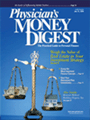Publication
Article
Physician's Money Digest
Batten Down Your Inheritance Hatches
Some baby boomers are finally realizing onesobering fact about retirement—their parentswon't be paying for it. A recent AARP study,based on the Federal Reserve Board's Survey ofConsumer Finances, concluded that only 15% of babyboomers expect to receive an inheritance. That's downfrom nearly 27% in 1989. And of the baby boomerswho have received an inheritance so far, the medianamount (half received more, half received less) was$47,909—not a sum that will go far in retirement.
This is sobering news for a generation that was readingnot long ago that it was going to inherit trillions andtrillions of dollars—with at least one estimate going over$100 trillion. More than a few baby boomers admittedlyhave underfunded their retirement accounts, relyinginstead on the large inheritances they expected to receive.
Smaller Inheritance
Inheritances are less than anticipated, in part, becausethey were never there. While the overall estimates arelarge, the bulk of the money is going to very few families.For example, a study released in 2000 by the FederalReserve Bank of Cleveland, calculated from a 1998Survey of Consumer Finances, reported that 92% ofhouseholds had inherited nothing. A little over 5% hadreceived an inheritance under $100,000 and a mere 1.6%had received more than $100,000.
Inheritances will be smaller or nonexistent for severalother reasons. Baby boomers' parents are livinglonger, thus eating up more of their accumulated assets.Health care and long-term care are proving especiallyexpensive. The current older generations are less inclinedthan earlier generations to pass on as much wealth aspossible—instead donating it to charities or spending iton an active lifestyle, including travel and entertainment.
Much of the accumulated wealth is annuitized inSocial Security, traditional pensions, and commercialannuities—meaning the money is being paid out in regularpayments. Those annuitized payments generallystop upon the death of the annuitant and the annuitant'sspouse. The bear market of 2000 through 2002 has alsoshrunk retirement savings.
Inheritance Assessment
The first step toward lessening the impact of anunexpectedly small inheritance is to realistically assessyour potential for a significant inheritance, though this isa subject older generations often don't like to discuss.But even if your parents live frugally on current retirementincome and have managed to stash away hundredsof thousands of dollars they plan to bequeath toyou, don't necessarily count on it unless you're confidentthey have other financial resources.
If a reliable, substantial inheritance is not on thehorizon, you need to look harder at your own resources.One of the first steps is to assess how much you actuallyhave accumulated for retirement and then calculatehow much more you need to save. According to their2004 annual retirement survey, the Employee BenefitResearch Institute (EBRI) and the American SavingsEducation Council found that fewer than half of theworkers surveyed have done so.
Pump up savings while you're still earning incomeand have tax-deferred savings vehicles available.According to the EBRI survey, 30% of workers aged 45to 54 and 29% of those aged 55 and over had savings,excluding the value of their home, of less than $25,000.At a minimum, you should be setting aside 10% of yourincome, many planners say, and 15% or more as younear retirement, if possible.
You may need to work longer before retiring, orwork part-time during retirement. But, like an inheritance,you can't always count on that. The EBRI surveyfound that 70% of current workers plan on working atleast part-time during retirement, yet 37% of currentretirees say they've been forced to retire earlier thanplanned due to health problems or unemployment.
This article has been produced by the Financial Planning Association(www.fpanet.org), the membership organization for the financial planningcommunity.
